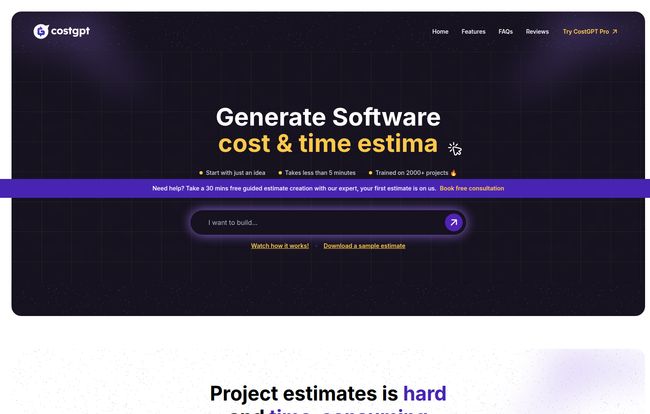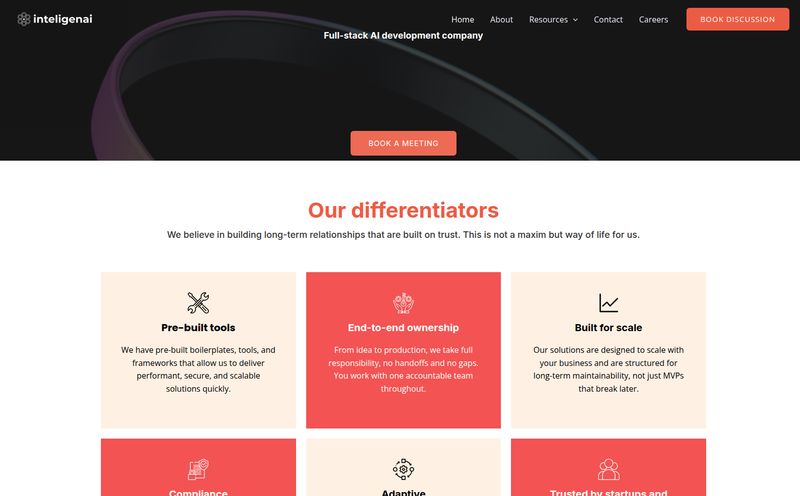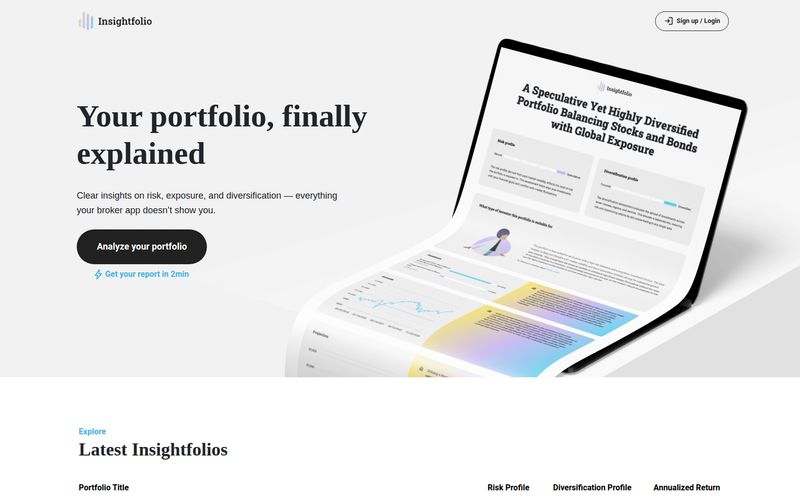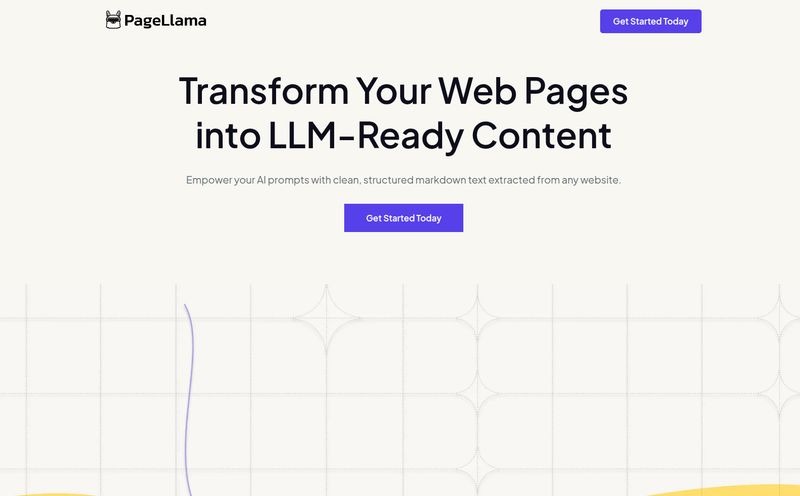Let’s have a little chat. You and me. If you’ve ever been on either side of a software development proposal, you know The Dread. It’s that sinking feeling when someone asks, “So, how much will it cost?” For the client, it's the fear of a number so big it makes their eyes water. For the developer or agency, it’s the beginning of a long, soul-crushing dance involving spreadsheets, guesstimates, and praying you haven’t forgotten a critical feature that will blow the budget later.
I’ve spent more hours than I’d like to admit in this spreadsheet-fueled purgatory. It’s a process that's both an art and a science, and frankly, I'm not always great at the science part. So when I see a tool pop up claiming to use AI to kill this particular dragon, my ears perk up. I’m skeptical, of course. I’ve seen a million 'game-changing' tools. But I'm also hopeful.
The latest gladiator to enter this arena is called CostGPT. And I have to say, after kicking the tires and taking it for a spin, it’s… actually pretty interesting.
What Exactly is CostGPT, Anyway?
Okay, cutting through the marketing fluff. At its core, CostGPT is an AI-powered software cost estimator. You feed it your grand idea for an app or a platform—the more detail the better—and it spits back a surprisingly comprehensive project plan. Think of it less like a rigid calculator and more like a brainstorming partner who’s also a seasoned project manager.
It doesn't just give you a dollar amount. That would be too simple, and probably not very useful. Instead, it breaks down the entire project into a series of documents that are genuinely helpful for starting a conversation with a development team. It gives you a project overview, a list of core features, dependencies (what you need to think about before you start), a sitemap, and even user stories and project milestones if you opt for the paid version.
How CostGPT Turns Your Idea into a Plan
The process is refreshingly straightforward. You’re presented with a simple text box and told to describe your software idea. This is where the magic, and the potential pitfalls, lie. A one-sentence prompt like “An Uber for cats” will get you a generic, probably unhelpful result. But if you take a few minutes to describe the user roles (cat owner, cat driver), key features (real-time cat tracking, payment integration, driver rating system), and your goals, the output becomes exponentially better.

Visit CostGPT
One of the slicker features is the ability to analyze a reference URL. Got a competitor you admire? You can pop their website into CostGPT and it’ll attempt to deconstruct their platform to help build your own estimate. It’s a brilliant move for market research and for getting a baseline understanding of what a similar product might entail.
In a few minutes, you get a downloadable document. It's not a legally binding contract, but it's a fantastic starting point. It takes you from a fuzzy idea in your head to a structured document you can actually discuss.
The Good, The Bad, and The AI-Generated
No tool is perfect, right? Especially in the AI space. Let's get real about what CostGPT nails and where you should be a little cautious.
The Good Stuff (The “Heck Yeah!” Moments)
First and foremost, the speed. What could take days of meetings and back-and-forth can be roughed out in under 10 minutes. For a startup founder trying to get a budget for their pitch deck, this is gold. It’s about moving fast and getting a tangible starting point.
It also provides fantastic feature and tech stack recommendations. This is like getting a mini-consulting session for free. The AI might suggest features you hadn't considered or recommend a technology stack (like React Native for a mobile app or Python/Django for the backend) that can kickstart the technical conversation with your build team. I've seen it suggest things that made me go, “Huh, I hadn't thought of that.”
Where It Gets a Little… Fuzzy (The Caveats)
Let's be clear: the name is CostGPT, not CostOracle. The estimates are just that—estimates. As the platform itself notes, their accuracy depends entirely on the quality of your input. This is the classic “garbage in, garbage out” scenario. The tool can't read your mind. It's a powerful assistant, not a psychic.
I once had a human consultant give me an estimate that was off by nearly 50% by the end of the project. So, an AI being a bit off isn't a dealbreaker. The key is to treat the output as a well-informed hypothesis, not as gospel. It’s the beginning of the budgeting process, not the end.
Let's Talk Money: CostGPT Pricing
The pricing model is pretty simple, which I appreciate. No confusing tiers or per-seat licenses. It’s project-based.
There's a Basic Plan which costs a grand total of $0. For free, you get a solid project overview, a list of core features and dependencies, and a basic sitemap. This is the “toe in the water” plan. It's perfect for anyone with a fledgling idea who just wants to see if it’s even in the realm of financial possibility.
Then there’s the Premium Plan. This is currently listed at $19 per project (apparently down from $49). For your twenty bucks, you get everything in the free plan, plus the two things that, in my opinion, are the most valuable: User Stories and Milestones. User stories are critical for defining how people will actually use your software, and milestones break the project into manageable phases. Honestly, if you're serious enough to be considering building something, this is a no-brainer. The value you get for $19 is way more than you’d get from an hour of a human consultant’s time.
Who Should Actually Use CostGPT?
This tool isn't for everyone, but for a few key groups, it’s a game-changer.
- Startup Founders & Solopreneurs: Need a realistic software development budget for your business plan or investor pitch? This is your new best friend. It gives you credible-looking documents without the four-figure consulting fee.
- Project Managers & Agencies: Use it to create a quick first draft of a project scope. It can save hours of initial discovery work and provides a solid foundation that you can then refine with the client.
- Non-Technical Folks: If you're an expert in your field but the thought of building software is intimidating, this tool translates your ideas into the language developers understand. It bridges a huge communication gap.
Who is it not for? If you're a massive corporation looking to integrate a new system with a dozen legacy platforms, this is probably too high-level for you. Your needs are far more complex and require deep, human-led architectural planning.
Answering Your Burning Questions about CostGPT
I poked around their site and pulled some of the most common questions people might have.
What exactly is CostGPT?
It's an AI tool that takes a written description of a software project and generates a detailed estimate of the cost, timeline, features, and required technology. Think of it as a rapid-prototyping tool for project plans.
How accurate are the estimates?
They are estimates, not quotes. Their accuracy is highly dependent on how detailed and clear your project description is. The best way to use it is as a starting point for budget discussions, not a final, fixed price.
I have my project plan, what do I do next?
This is where the real work starts! You take the documents generated by CostGPT—the feature lists, user stories, and tech stack—to a development agency or freelance developer. It gives you a much more concrete starting point for a serious conversation.
What about the tech stack recommendations? Should I stick to them?
The tech stack suggestions are generally solid and based on common industry practices. However, always defer to the expertise of your development team. They might have valid reasons for choosing a different technology based on your specific needs for scalability, security, or their own team's expertise.
Is there customer support if I need help?
The site mentions a contact email ([email protected]) and a consultation booking option. For a tool this straightforward, you might not need much help, but it's good to know there's a way to reach out.
So, What's The Verdict?
Look, AI isn't going to replace the seasoned, expert product manager tomorrow. But tools like CostGPT are fundamentally changing the starting line. They're democratizing the very first—and often most intimidating—step of bringing a digital product to life.
CostGPT isn't a magic wand. It won't build the software for you. But it does an incredible job of taking the messy, chaotic energy of a new idea and shaping it into a structured, actionable plan. It transforms the dreaded question of “How much will it cost?” from a moment of fear into the start of an exciting, well-informed conversation. And for anyone who's ever been stuck in that spreadsheet-fueled nightmare, that's a pretty big deal.
Reference and Sources
- CostGPT Official Website
- Atlassian's Guide to User Stories - A great resource for understanding one of the key outputs of the Premium plan.



